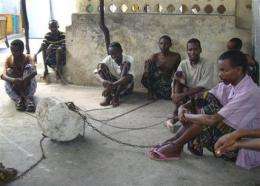Kept in chains: Mental illness rampant in Somalia

(AP) -- Hassan Qasim lies shackled to a wall in a hallway with 25 other patients at a clinic for the mentally ill. He whispers under his breath and spits at his neighbors. Torn and dirty clothes hang off his skinny frame.
Doctors say the 25-year-old's brother and sister were killed in front of him, and that he was abducted and tortured by gunmen. Soon after, Qasim began wandering the streets naked, lashing out at passers-by.
In this Horn of Africa nation that has been mired in anarchy and war for two decades, nearly all families have been touched by tragedy. The World Health Organization estimates that one in three Somalis have suffered from some kind of mental illness, a rate that is among the highest in the world.
Gunfire crackles every few seconds in Mogadishu at night, and mortars scream out of the sky.
"We believe every bullet or mortar will cause more people to become mentally ill," said Dr. Abdirahman Ali Awale, a Somali psychiatrist.
Somalia's civil war also has simultaneously destroyed health care infrastructure to treat the traumatized. A World Health Organization report found that the country has only three psychiatrists and no psychologists working at its five main mental health facilities.
As a result, some Somalis have been chained up in mental wards for as long as eight years, according to the WHO. At one mental health facility, almost 50 percent of patients were chained. At other clinics, doctors recite the Quran to patients, hoping it will improve their condition.
This year, WHO began giving medicine and other supplies to the Habeb mental hospital, the only facility that treats patients without detaining them.
"Our treatment is chain-free. We never restrain them," said Dr. Abdirahman Habeb. He says the facility has treated more than 9,000 psychiatric patients using a combination of medicine and counseling. Still, the majority of mentally ill people in Somalia face much grimmer prospects.
The Somali government, which is consumed by political infighting and battling an al-Qaida-linked insurgency, is unable to even assert control over all of Mogadishu much less help its traumatized population. It relies on 9,000 African Union peacekeepers to retain control of half the country's capital.
Dr. Rizwan Hamayun, who helped write a WHO study earlier this year examining mental health in Somalia, said the chaos has resulted in a loss of jobs, family, homes and property which in turns can contribute to mental illness. His latest new patient was a shepherd who attempted suicide after losing all his animals not to war but to a natural calamity - an ongoing drought.
While poverty and fear are the main triggers for mental illness, some also have been intimidated by continuous threats made by insurgents over mobile phones. Insurgents call and threaten people they suspect of collaborating with the government. As punishment for alleged crimes, insurgents saw off captives' hands and feet in public squares and stone people to death.
The insurgents accused Ibrahim Nuraddin of selling phone credit, bread, and other small items to Somali soldiers. The elderly former shopkeeper had a mental breakdown after receiving frequent death threats, relative Ibrahim Farabadn said.
Nuraddin had already spent one year imprisoned in his family's house or tied to a tree. Finally, relatives sought treatment after hearing that a Mogadishu clinic was taking patients. Three hefty men dragged Nuraddin into the clinic but he struggled to escape. They quickly chained him up.
©2011 The Associated Press. All rights reserved. This material may not be published, broadcast, rewritten or redistributed.












